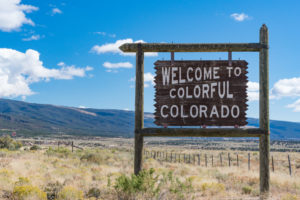 Recently, I visited seven Colorado colleges in about two and a half days. Yes, it was exhausting. No, I don’t recommend visiting that many schools in that amount of time. That said, if beautiful scenery, access to the great outdoors, and superb academic programs sound appealing, you should consider a college in Colorado. From a military service academy, to large and mid-size state universities, to private liberal arts colleges, Colorado has options for every student.
Recently, I visited seven Colorado colleges in about two and a half days. Yes, it was exhausting. No, I don’t recommend visiting that many schools in that amount of time. That said, if beautiful scenery, access to the great outdoors, and superb academic programs sound appealing, you should consider a college in Colorado. From a military service academy, to large and mid-size state universities, to private liberal arts colleges, Colorado has options for every student.
The United States Air Force Academy: Nestled in a picturesque valley outside of Colorado Springs, the Airforce Academy is not your typical college experience. The Academy admits about 13% of applicants to create a freshman class of 1,400 cadets. Unlike a typical college, which asks for letters of recommendation from teachers, the Air Force requires a nomination from your U.S. Senator or Representative. Students don’t pay anything to attend, but upon graduation, they owe the Air Force five years of service. In addition to science and math, the Academy offers majors such as philosophy, history, and management. According to my tour guide, you don’t need to major in a STEM field to become a pilot. As he said, “Poli sci and fly, bro!”
University of Colorado, Boulder: The University of Colorado, Boulder is the state’s largest public university, with 27,600 undergraduate students. The university offers 100+ majors. Students may also choose from over 30 five-year Bachelor’s/Master’s programs during their senior year. The university is divided into eight colleges, with Business and Engineering being the most competitive to get into. For those who are undecided, the Exploratory Studies Program offers an opportunity to investigate numerous courses of study while receiving extra academic advising. Not surprisingly, CU Boulder is consistently voted one of the most beautiful campuses in the nation.
University of Colorado, Colorado Springs: UCCS is Boulder’s smaller sibling with about 7,800 undergraduates. The university is undergoing quite a bit of growth and new buildings are popping up all over the west side of campus. The Hybl Center combines a real world business (Centura Health) with classroom and lab space. Students in the health fields study and learn on the top three floors and then complete internships on the first floor. The Ent Center for the Performing Arts houses four performance spaces. UCCS programs of note include a unique Bachelor of Innovation which combines principles of engineering and business into one major, as well as mechanical and aeronautical engineering, social work and an audition-based music program.
Colorado School of Mines: Mines may look and feel like a private college, but it is actually a public university. Majors focus on STEM fields and the college promotes technical education, experiential learning and teamwork. Women make up 31% of the student body and Mines boasts the largest Society of Women Engineers organization on any campus. Nearly 500 companies attend the Mines Career Fair and 92-94% of seniors have a job immediately upon graduation. Mines students aren’t just hitting the books. The college’s DII football team is currently number three in the nation and the campus offers 12 performing arts ensembles and 300+ clubs and organizations. Additionally, it’s in a fabulous location in the historic town of Golden, just outside of Denver.
Colorado State University: Located in Fort Collins, CSU is about an hour north of Denver. Even with 24,000 undergrads, the university has a warm and welcoming vibe. The campus is large and includes many green spaces where students gather. Five of the 70 majors have very competitive admissions: business, engineering, computer science, journalism and biomedical science. Students may be offered admission into the Exploratory Studies Program (similar to the program at CU Boulder) if they don’t yet meet the qualifications for one of these majors. While 69% of students hail from Colorado, the university has students from all 50 states.
Colorado College: The smallest of all the colleges I visited, with just 1,900 undergraduates, CC also has a very low acceptance rate of 11%. This highly selective liberal arts college in Colorado Springs employs the Block Plan, in which students take one course for 3 1/2 weeks followed by a four day block break. Students typically complete eight blocks per year. The college offers several interdisciplinary majors, as well as accelerated engineering and law programs. Surprisingly for a small school, CC has DI men’s hockey and women’s soccer; the rest of its athletic teams are DIII. In-state students can take advantage of the Colorado Pledge, which matches the cost of attendance at the state’s flagship university for students whose families earn $250,000 or less. In addition, CC meets 100% of demonstrated need for out-of-state students whose families earn $250,000 or less.
University of Denver: DU is a mid-size private college located in Colorado’s largest city. There is a light rail station on the edge of campus and students receive free transit passes. DU operates on the quarter system, which can make summer internships with businesses a bit difficult. However, students say there are plenty of internship and research opportunities available on campus. Freshmen and sophomores are required to live in the residence halls; many upperclassmen move into university-owned apartments. DU’s campus in the Rocky Mountains opened this spring and offers students an opportunity to experience nature and focus on wellness. The university anticipates the mountain campus being utilized for field work and student retreats, among other activities.
If you like the idea of getting an excellent education while being able to ski, hike, rock climb and camp when you’re not studying, I highly recommend looking at colleges in Colorado.





